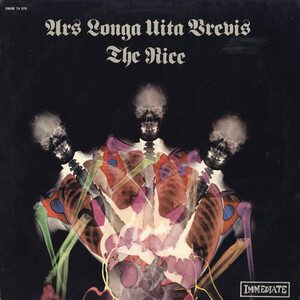Ars Longa Vita Brevis (album)
| Ars Longa Vita Brevis | ||||
|---|---|---|---|---|
 |
||||
| Studio album by The Nice | ||||
| Released | November 1968 | |||
| Recorded | 1968 | |||
| Genre | Psychedelic rock, progressive rock | |||
| Length | 40:13 | |||
| Label | Immediate | |||
| Producer | The Nice | |||
| The Nice chronology | ||||
|
||||
| Professional ratings | |
|---|---|
| Review scores | |
| Source | Rating |
| Allmusic | |
| Rolling Stone | (neutral) |
| TopTenReviews | |
Ars Longa Vita Brevis is the second album by the English progressive rock group the Nice.
Guitarist David O'List left the band during the recording of the album, leaving the remaining three members to complete it. After flirting briefly with replacement guitarists (including Steve Howe, later to join Yes), the Nice decided to carry on as a keyboard-led trio. The title is an aphorism attributed to Hippocrates usually rendered as "Art is long, life is short"; Keith Emerson's interpretation of this can be gauged from his sleevenote:
Newton's first law of motion states a body will remain at rest or continue with uniform motion in a straight line unless acted on by a force. This time the force happened to come from a European source. Ours is an extension of the original Allegro from Brandenburg Concerto No. 3. Yesterday I met someone who changed my life, today we put down a sound that made our aim accurate. Tomorrow is yesterday's history and art will still be there, even if life terminates.
Structurally the album started where its predecessor left off—shortish songs and extended work-outs based on classical themes—but a step forward was taken with the addition of an orchestra and the extended length of Ars Longa Vita Brevis itself, foreshadowing the later Five Bridges Suite. Furthermore, this album contains some songs in which Keith Emerson sings lead vocals: he shares the singing duties with Lee Jackson in "Daddy, Where Did I Come From", sings all lead vocals on "Happy Freuds" and sings the bridge in "Little Arabella".
Guest guitarist Malcolm Langstaff died in 2007.
Allmusic's Bruce Eder described the album as "a genuinely groundbreaking effort".
All songs written by Keith Emerson and Lee Jackson, except where noted.
...
Wikipedia
